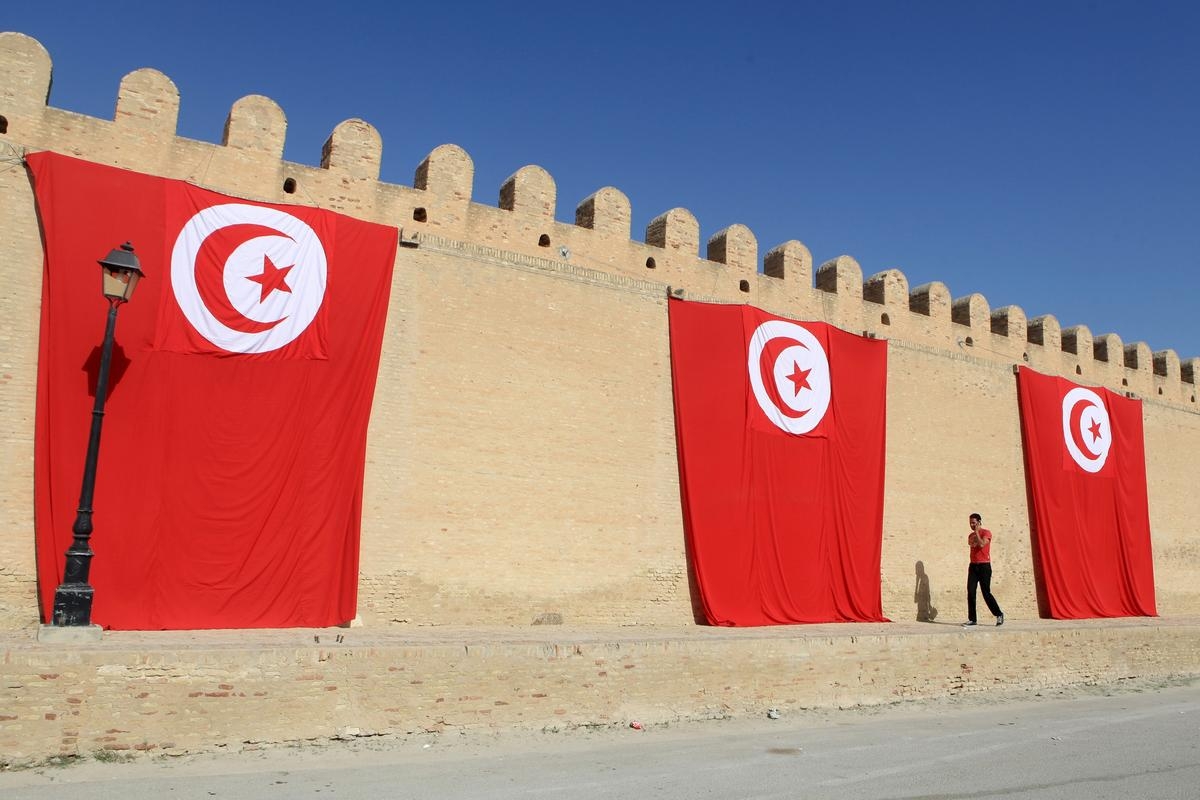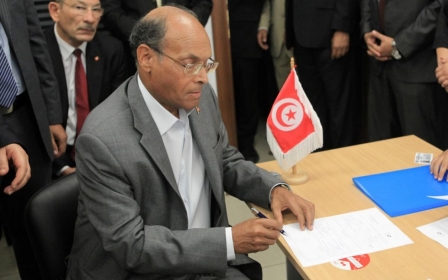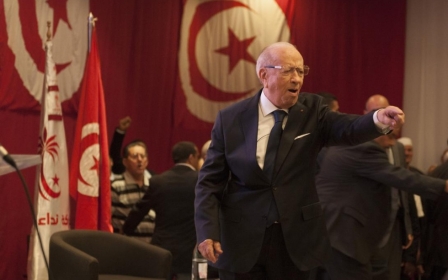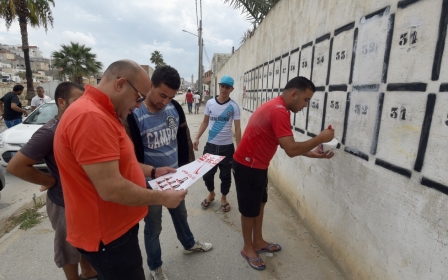Progress woes, hopes mark run-up to Tunisian elections

TUNIS - Many of Tunisia’s 5.2 million registered voters will soon be voting in legislative elections. Scheduled for this Sunday, 26 October, the elections will be the second since the 2011 revolution that toppled autocratic president Zine El Abidine Ben Ali.
The elections that followed that year were widely regarded as free and fair and an exemplar of participatory democracy for the region, but three years later, not all Tunisians view the forthcoming poll as worthy of their participation, nor are they impressed by the country’s progress since Ben Ali’s downfall.
While disenchantment bubbles in certain areas of the country and neighbourhoods in the capital, many eligible Tunisian voters – more than 75 percent of whom have registered, according to the Independent Higher Authority for Elections – say they will head to the polls this weekend despite the post-revolution economic and social challenges that remain.
Halfaouine market, deep inside Tunis’ old medina, an island of narrow, cobbled streets, open-air souks and the 8th century Zaytuna Mosque, is a quarter seldom frequented by tourists, but is popular with local bargain hunters buying produce and meat from the likes of 60-year-old Rachid Ferjani, a local butcher.
Ferjani told Middle East Eye that he is watching his television closely. He has four short days to make up his mind.
“I will see what the journalists are speaking about, who they are criticising and who they are not criticising, and I will compare to see who’s good,” he explained.
Fish seller Abderraouf Jendoubi spent seven years in prison during Ben Ali’s rule. He had been imprisoned for belonging to the moderate Islamist party Ennahdha. What differentiates this year’s elections, he says, is the return of officials who worked with Ben Ali.
These officials were prohibited from running for office in the 2011 National Constituent Assembly (NCA) elections. “They made a powerful comeback, they are the ones who tortured us,” Jendoubi said. “I will vote for Ennahdha, long Live Ennahdha.”
Senior members of the former regime are allowed to participate in this year’s presidential and legislative elections as a political exclusion law was eventually rejected after long heated debates. At least seven parties formed by former regime officials are participating in the legislative elections, and four former ministers will take part in the presidential elections, scheduled for 23 November.
Nidaa Tounes party, formed shortly after the 2011 elections as a secular counterweight to Ennahda, is widely perceived to have a number of former regime figures. The party’s founder and leader Beji Caid Essebsi, who is also running for the presidency, served in various posts under presidents Habib Bourguiba and Ben Ali.
A few meters down the lane in Halfaouine at a poultry shop, unemployed Najet Bahrouni helps her brother, the owner. She said she feels that Tunisia “is moving backwards rather than moving forward”.
For the 25-year-old, only experienced Essebsi, she said, is capable of making a difference which is why she plans to vote for Nidaa Tounes. Tunisia needs “someone who’s powerful,” she said.
Twenty-three-year old Mohamed Karchaoui, who works at his father’s spice shop and does not plan to vote on Sunday, said he sees little prospect for post-election change and Tunisia’s “economic crisis”.
“All parties are working for their own benefit,” he said. “I myself will not be voting for anyone.”
Shopkeeper Abdelmajid Lajneh said that he wants a more secure and stable Tunisia. “We would like the country’s security to improve, the economy too,” he said.
Bahrouni, Karchaoui, and Lajneh aren’t alone in their views. In a Pew Research Center survey conducted between April and March 2014, 88 percent of Tunisians interviewed described the country’s economic situation as ”bad”, and 56 percent described it as “very bad”.
The economic challenges facing the country greatly influence Tunisians’ perception of democracy. According to the same survey, “just 48 percent of Tunisians now say democracy is preferable to other kinds of government, down from 63 percent in a 2012 poll”.
That sense of disillusionment with the political process and parties has become a major feature of street sentiment during the election campaign. A widely felt view is that post-revolution promises made by political parties of better living standards, more employment opportunities, and regional development have not come to fruition.
While Tunisians under Ben Ali’s rule were deprived of their liberties, what triggered the revolution was broad economic discontent and social demands, according to Romdhane Ben Amor, the communication officer for the Forum for Economic and Social Rights, a Tunisian non-profit organisation.
“We were imagining that the 2011 elections will meet the bare minimum of the expectations of Tunisians in terms of societal and economic issues,” Ben Amor told Middle East Eye.
But in the post-revolution period and even after the 2011 elections, social discontent remained and demonstrations continued sporadically throughout the country.
This discontent remains one of the key challenges that consecutive interim governments have failed to address adequately. It is most severe in the inner regions and endemic in Sidi Bouzid, about 300 kilometers south of Tunis and the birthplace of the revolution and the entire Arab Spring.
Ali Charfi, 28, a member of Amal for Development and Solidarity, an organisation based in Kasserine, an impoverished inner governorate west of Sidi Bouzid which was one of the first to rise against Ben Ali, attributes the dissatisfaction of voters in his own hometown to the political parties’ inability to meet the promises they made in 2011.
“Kasserine has remained marginalised, and the promises that political parties made in 2011 were not achieved,” Charfi told MEE. As an example, he points out that, despite promises of greater funding, “the worst hospital is in Kasserine”.
The social discontent has important implications, not only for the outcome of the elections, but also for regional security. Kasserine is close to Algeria, and is home to the Chaambi mountains, where a spate of militant attacks against Tunisian authorities have taken place. Since 2012, many soldiers have been killed in these attacks and many more wounded, threatening the stability of the government.
Continuing attacks and economic strife has made impoverished regions such as Kasserine one of the major policy focuses of Tunisian political parties.
These policies, however, “remain on paper”, according to 29-year-old Achref Yahyaoui, a member of the Youth for the Future, a youth-led organization in Bargou city in northwest Tunisia.
According to Yahyaoui, impoverished regions like Kasserine and small cities such as Bargou lack decent infrastructure, a necessary antecedent to economic development. “When you don’t have good infrastructure or even just paved streets, it’s normal that investors won’t come,” he said.
The lack of internal development can be traced back to Ben Ali’s era, when the vast majority of state and private investment went into the more-populated coastal areas. That is why Ben Amor sees an urgent need for a new mode of development that fosters more “equality and equity between regions”.
Tracing the lack of economic development in the inner regions back to the Ben Ali regime, however, is not the only perspective. Thirty-year-old Achref Gairsen, president of the Association for Fundamental Rights and Liberties, a local NGO that operates in the south-east state of Tataouine, sees another factor contributing to the lack of development. For Gairsen, the consecutive assassination of two opposition politicians marked a change in Tunisian political rhetoric.
Chokri Bel Aid, a key opposition leader, was assassinated in February 2012 and NCA member Mohamed Brahmi was assassinated in July the same year.
Bel Aid’s killing led to large protests and a reshuffle of the government led by the Islamist party Ennahda. The second assassination culminated in a five-month political stalemate, with a number of NCA members calling for the dissolution of the Assembly and the government refusing to stand down.
Prolonged talks mediated by Tunisian civil society groups eventually brokered a deal whereby the NCA would be allowed to finish creating a constitution, then Ennahda would cede power to a caretaker technocratic government that would secure the upcoming elections.
Gairsen said that, before these events, the political scene was chiefly focusing on identity politics and ideologies rather than on reform policies. “The ideological discourse” for Gairsen had “a lot of radicalisation” from right to left.
While ideological discourse is waning and politicians are now presenting detailed programs, the risk according to Gairsen is whether the voters are able to discern whether or not a certain programme is achievable.
Both Gairsen and Ben Amor believe that civil society initiatives such as “Ntalbek w Nhasbek” can help to hold politicians to account, monitoring whether policy promises are achieved or not. “Ntalbek w Nhasbek” roughly translates to “I ask you, and I hold you accountable”.
And perhaps that is what the Tunisian revolution was really all about - giving workers such as those in the Halfaouine market the ability to hold their leaders accountable for the economic and social situation of their country, by voting them in, voting them out or, by one's own choice, not voting at all.
New MEE newsletter: Jerusalem Dispatch
Sign up to get the latest insights and analysis on Israel-Palestine, alongside Turkey Unpacked and other MEE newsletters
Middle East Eye delivers independent and unrivalled coverage and analysis of the Middle East, North Africa and beyond. To learn more about republishing this content and the associated fees, please fill out this form. More about MEE can be found here.




